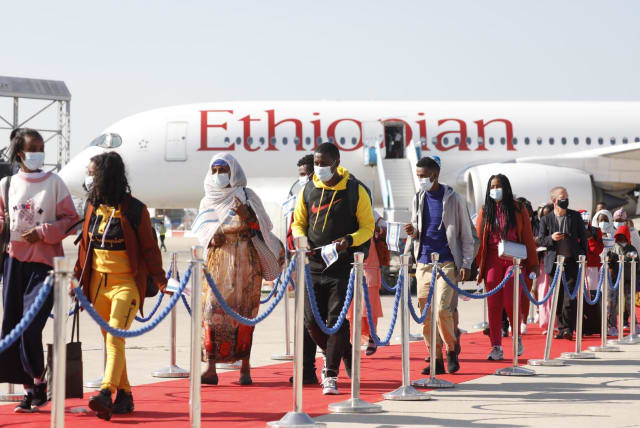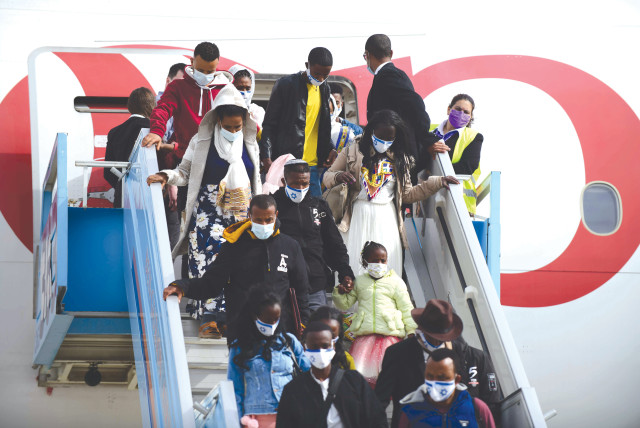As a child of survivors, I see my parents in every Ethiopian immigrant to Israel

Similar stories of suffering and making aliyah to Israel unite Israelis of all backgrounds.
Recently, I watched a mother reunite with her son for the first time in 41 years.
On May 9, I was part of a delegation of the Jewish Agency for Israel that accompanied Ethiopian olim (immigrants) from Addis Ababa to Ben Gurion Airport and new lives in Israel. The mother had made aliyah in 1982 as part of Operation Moses, when Ethiopian Jewish immigrants trekked for weeks through the Sudan, hiding out from authorities in the daytime and walking by moonlight, to reach Israeli Mossad agents, who were secretly facilitating their transport to Israel.
But the son, due to family circumstances, was left behind. And here she was on the tarmac, praying and crying, and the embrace they had when the now grown man walked down the stairs, that depth of emotion after decades of waiting and yearning, was something that I will never forget.
The Ethiopian Jewish community dates back some 2,500 years, from around the time of the destruction of the First Temple. We know that they have always yearned, from generation to generation, to be in Jerusalem. Most of the Ethiopian Jews emigrated to Israel during the 1970s and 1980s and in one weekend in May 1992, a covert Israeli operation, dubbed Operation Solomon, airlifted more than 14,325 Ethiopian Jews to Israel over 36 hours. Those coming today are being reunited with family members who came during one of these earlier operations.
On my four-day trip from Addis Ababa to Tel Aviv and Jerusalem, I listened to the stories of incredible perseverance, and of heartrending suffering, among Ethiopian Jews — our brothers and sisters. Close to 100,000 of them have made their way to Israel over the past 40-plus years, fulfilling this community’s centuries-long quest to come to Israel.
I heard about the Ethiopian Israeli who, as a 15-year-old, marched through Sudan with his family and lost three of his siblings to starvation. I heard the stories of families waiting, for months or years, for that moment of aliyah, as clandestine negotiations among government negotiators dragged on. It was so powerful to hear of the sacrifices they made and how strong the dream was, and is today, of coming to Jerusalem, to Israel.
A different time, under different circumstances
And I thought of my own family’s journey — a different time, under different circumstances. But also a Jewish journey of perseverance, suffering and, for the fortunate among us, survival.
My parents were born in Poland in the 1930s. During World War II, my father and his family survived in a Siberian labor camp and then in a remote part of Poland. My mother’s family managed to get work papers, but her father did not have them. He survived the war by hiding under the floorboards of a barn on a farm where they were living. The woman who owned the farm did not know they were Jewish, so it was a harrowing day-to-day existence.
But my mother and father survived, managed to make it to liberation, and eventually came to the United States. They were first sponsored by the Birmingham, Alabama, Jewish community, and then made their way to New York and New Jersey, where our family has built a new life. We now have fourth-generation children growing up here in New Jersey, and we feel so fortunate for the lives we have.
Here is the essential difference from their story and mine: For my family, there was no state of Israel. Many members of my family perished in the Holocaust. There was nowhere for them to go.
This drives what I do. Today, everything has changed because we have a state of Israel, and we have a Jewish Agency that ensures that Jews can make aliyah and helps them make new lives in Israel.
Last year, after the Russian invasion of Ukraine, I traveled to Poland and stood at the border as thousands of Ukrainian refugees streamed across. I was standing only a few miles from where my grandfather hid under the floorboards of that barn about 80 years earlier. Back then, there was no one there to protect my family, no one to do anything for them. And here I was in 2022 standing amid a massive array of aid agencies, and the very first thing these refugees saw — whether they were Jewish or not — were signs with the Star of David, marking the Jewish Agency, the American Jewish Joint Distribution Committee and other Jewish groups.
While there has been significant hardship and struggle for the first generation of Ethiopian Jews in Israel, it was incredibly inspiring for me to meet members of the second generation — those who made the trek as children or teenagers in the 1980s and ’90s — who are now Israeli adults in positions of leadership and significant responsibilities. We heard from Havtamo Yosef, who immigrated as a young child from Ethiopia with his parents, and then watched his father become a street sweeper and his mother a house cleaner while he was growing up. Now he heads up the entire Ethiopian Aliyah and Absorption services for the Jewish Agency, ensuring that there are stronger absorption procedures, better education and firmer foundations for better lives for these new immigrants than there ever was for his family.
While there was no Israel for my family when we were refugees, there were — in Birmingham, Alabama; in Hillside, New Jersey; and everywhere along the way of my family’s journey — people who thought outside of themselves, who cared and took care of my relatives. This is my legacy and what motivates me today.
So when I stood on the tarmac at Ben Gurion earlier this month, I cried tears of sadness at the long family separations and tears of joy that today this Jewish journey continues, from Ukraine and Russia and Ethiopia to Israel. Today, there is a place to go and a people to welcome Jews on that tarmac, with an Israeli flag, a smile and a warm embrace, and a promise of better lives in freedom.
Jerusalem Post Store
`; document.getElementById("linkPremium").innerHTML = cont; var divWithLink = document.getElementById("premium-link"); if (divWithLink !== null && divWithLink !== 'undefined') { divWithLink.style.border = "solid 1px #cb0f3e"; divWithLink.style.textAlign = "center"; divWithLink.style.marginBottom = "15px"; divWithLink.style.marginTop = "15px"; divWithLink.style.width = "100%"; divWithLink.style.backgroundColor = "#122952"; divWithLink.style.color = "#ffffff"; divWithLink.style.lineHeight = "1.5"; } } (function (v, i) { });

